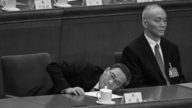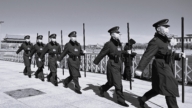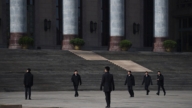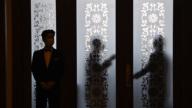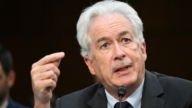【新唐人2012年12月26日訊】西安「9‧15」反日遊行中,砸穿日系車主顱骨的蔡洋一直認為:他是在愛國、在抵制日貨。但蔡洋毆打的對像不是日本人,而是一名50多歲的中國人。為甚麼會出現這種現象?英國媒體指出,這是因為中共的愛國教育扭曲了中國人的世界觀。
英國《金融時報》24號的文章「愛國主義教育扭曲了中國人的世界觀」,寫道:蔡洋的母親,為21歲兒子用自行車鎖毆打一名開豐田車的車主時,辯解說:「學校一直向學生灌輸這樣的觀念,那就是日本是個邪惡的民族。而這些日子你一打開電視機,大多數節目和連續劇都是抗日故事,你怎麼能不恨日本人呢?」 文章表示,「她的話有相當的道理」。
大陸學者鞏勝利:「老百姓把反抗日貨、反對日本佔領釣魚島事件,成了老百姓所有人洩憤的一種方式,日本沒有得到應有的反對,反而使中國受害不少。」
《金融時報》還指出,自1989年的天安門事件,以及前蘇聯與東歐社會主義陣營解體後,中共發起一場延續至今的新的愛國主義教育運動,也就是:有選擇的講述歷史,強調外國侵略者侵佔中國領土時的兇狠殘忍,替代了之前的以「階級鬥爭」為主的思想教育運動,對中國統治者的錯誤缺點避而不談,就是用遭受西方侵略的歷史,來培養年輕人的民族主義精神。
鞏勝利:「它的教育是偏頗的,比如說他的電視教育,一個是鬥爭、一個是暴力,還一個是血腥,電視裡面充斥著這種你死我活的這種戰爭的教育。」
大陸學者鞏勝利還指出,共產黨執政的理念還是「佔山為王」時的思想,就是:用暴力維持、暴力執政,暴力對待。所以公民,不講憲法、不講法制,共產黨在一切法律之上,教育也是走極端,教人迷信暴力。
《金融時報》指出,這種「愛國教育」的後果是,在世界其他國家眼中,中國是一個強大到令人害怕的國家,它時常會欺負弱小國家。但在許許多多中國人的心中,他們認為中國仍然非常貧困、弱小、並遭人欺侮。
事實上除了朝鮮和巴基斯坦之外,幾乎所有這些地區的重要國家,都與中國有領土爭端,與日本領土爭端最激烈。《金融時報》認為,這個月的日本大選,強硬派獲得壓倒性勝利,也使得中日局部衝突具有可能。
中國社科院24號在北京發佈的《國際形勢黃皮書》也承認,釣魚島問題不斷升級,不能排除危機有進一步升級甚至爆發衝突的風險。
時事評論員朱柯明認為,中共宣傳愛國主義、煽動民族主義,真正的意圖不是領土的完整,而是中共的政權,領土隨著形勢的變化,隨時可以被它當作禮物送掉。
時事評論員朱柯明:「很多領土是共產黨主動出賣、出讓給其他國家的,這一點他是不敢講。出賣中國領土最嚴重、賣國最厲害的,那不就是江澤民嗎?它在一個小小的島上大做文章,在一個台灣問題上大做文章。實際上共產黨自周恩來、江澤民、毛澤東出賣的外蒙古、中印邊界、還有東北大面積的土地,那是幾百萬平方公里。」
1999年12月9號和10號,江澤民與俄羅斯政府簽定了《關於中俄國界線東西兩段的敘述議定書》,這一條文將中俄世代相爭的領土拱手讓給俄羅斯,同時承認了從中華民國到歷屆中共政府都拒絕承認的「中俄九項不平等條約」,永久性的斷絕了後代子孫的討還之路。那些領土面積約300多萬平方公里,相當於100多個台灣。
採訪/田淨 編輯/宋風 後製王明宇
UK Media: Chinese Communist Party Patriotic Education Warps Chinese Worldview
During an anti-Japanese demonstration this
September in Xi’an, a man named Cai Yang
cracked the skull of a Japanese car owner.
Cai Yang asserted that he is being patriotic,
and was boycotting Japanese goods.
However, the object of Cai’s attack was not a Japanese
person but a was 50-year-old Chinese citizen.
How could this happen with today’s Chinese people?
UK media comment that this is a warped worldview formed
by Chinese Communist Party (CCP) patriotic education.
Financial Times Chinese website
published an article on Dec. 24.
It stated that patriotic education has
warped Chinese people’s worldview.
Cai Yang’s mother defended her son, saying that “Cai
has long been instilled with such a world view in school.”
“That is, Japan is an evil nation.”
“Most of the recent TV programs and TV
serials all involve anti-Japanese stories.
How can you not hate the Japanese then?”
Financial Times Chinese commented
that, “her words really make sense.”
Gong Shengli, Chinese Scholar: “Chinese people view it
as a channel to vent, by boycotting Japanese products
and protesting Japan’s occupation of the Diaoyu Islands.
In this way, Japan actually wasn’t given due condemnation.
Rather, many Chinese became victims of such a riot.”
The FT article reviews that after the 1989 Tiananmen incident
and the collapse of the former Soviet Union and Eastern Bloc,
the CCP launched a nationwide neo-patriotic education
campaign which has lasted until today.
That is, selectively educating history, highlighting
foreign aggressors’ cruelty when invading China.
This replaces previous CCP ideological
education dominated with “class struggle".
This neo-patriotic education has evaded injustices and
mistakes that have been committed by CCP rulers.
The FT article comments that the communist
regime uses a history of Western aggression
to foster nationalism within the Chinese youth.
Gong Shengli: “Its education is biased, such as its TV
programs, full of power struggles, violence and bloodiness.
All these advocate an all-out power struggle."
Gong Shengli remarks that the CCP’s
governance is still based on violence.
This led to the CCP overriding all laws in China.
The CCP’s education also teaches Chinese
a blind belief of violence, says Gong.
The FT article indicates the aftermath of this
patriotic education, that in the world,
today’s China is viewed as a powerful but scary state,
which often bullies weaker nations.
However, in the minds of numerous Chinese,
China is still very poor, weak and humiliating.
In reality, except for North Korea and Pakistan,
nearly all other major Asian countries have had territorial
disputes with China, with the most intense being with Japan.
The FT says that the Japanese hardliners’
landslide victory in this month’s election
may lead to regional China-Japan conflicts.
On Dec. 24, the Chinese Academy of Social Sciences
released the “Beige Book” on the international situation.
It admits a continuous escalation
of the Diaoyu Islands disputes.
The report claims that it does not rule out an
escalation of tensions, and even erupting clashes.
Critic Zhu Keming interprets the true intentions behind
the CCP’s propaganda of patriotism and nationalism.
The regime’s goal is not to safeguard
territorial integrity, but to keep CCP rule.
China’s territories can be gifted anytime
to meet CCP’s political needs, he says.
Zhu Keming: “A lot of China’s territories
were proactively traded away by the CCP.
It fears making this information public.
Wasn’t it Jiang Zemin who traded away the
largest amount China’s territories in history?
By contrast, the regime now vigorously makes
a big fuss on a small island and Taiwan issues.
In fact, the CCP has traded away several million
square kilometers of China’s territories, including
Outer Mongolia, Sino-Indian border territory.
It also includes large areas in Northeast China.
The culprits include Zhou Enlai,
Jiang Zemin and Mao Zedong.”
In December 1999, Jiang Zemin signed a Protocol on the
Sino-Russian Boundary with the Russian government.
The lands covered were given
away to Russia by Jiang Zemin.
The protocol also admitted nine unequal
items of the Sino-Russian treaty.
The ceded territory was about 300 million square
kilometers, equivalent to more than 100 Taiwans.




